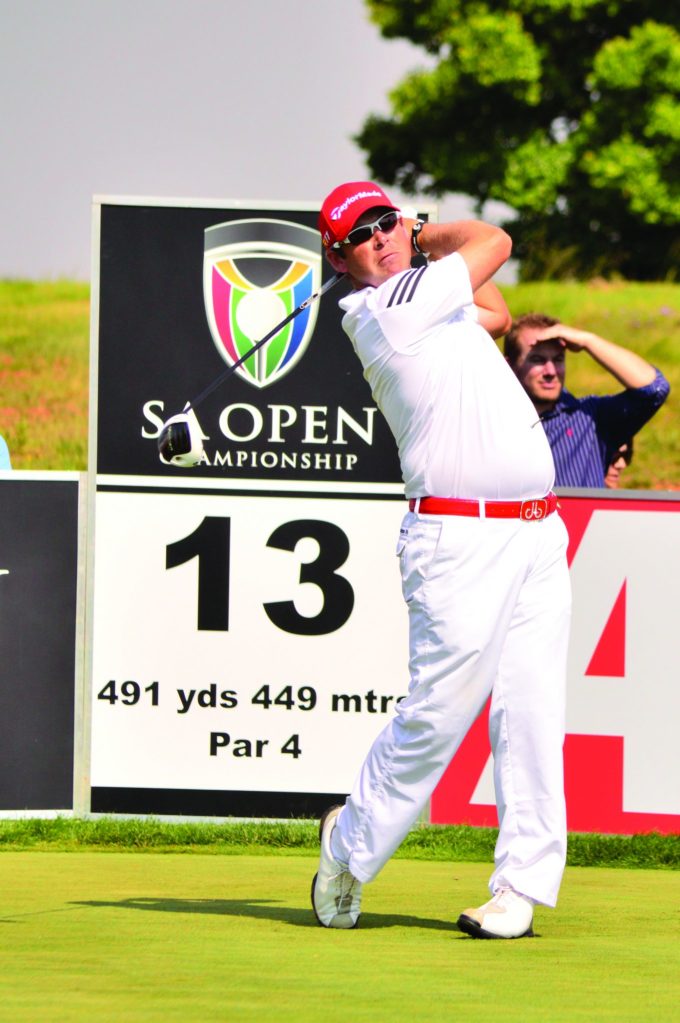As the 2013 European tour began at Royal Durban Country Club in South Africa in December, the tour had a new member—take note of this name: Justin Walters. Like Branden Grace in 2012, here was another young man from South Africa on the verge of a breakthrough in the tough world of professional golf.
Also like Grace, Walters, 32, goes into his European tour campaign with just one backyard victory to his credit in the Sunshine Tour. Unlike Grace, who enjoyed a fairy-tale rise, it has been a grim journey for Walters. When he was four years old, Walters suffered a damaging and traumatic eye injury.
“I have 50 percent vision in my right eye. I suffer with double vision and lazy eye, you name it,” says Walters in the players’ lounge at Serengeti Golf and Wildlife Estate, where he was playing the 102nd South African Open in November.
“I fight a lot of conditions with it. When I was four years old, I had a pine needle go straight through my eye. I’ve had several operations, five or six, trying to help it. Right now, it’s as good as it’s going to get. I have a contact lens in my right eye. I’ve had it [the condition] so long, maybe it does hurt me, but I’m so used to it now. I can’t spend too much time dwelling on it.
Walters explains that overcast skies, rather than bright sunshine, are the biggest worry for him on the golf course.
“There will be several occasions when I’m out on the golf course when I can see two golf balls, four sets of shoes and my double vision really causes havoc. I wear Oakley sunglasses all the time, the guys take care of me and really get me through a day’s golf. They limit the fatigue on my eyes and help me do my job as good as I can.”
Securing playing privileges doesn’t come much tougher than playing the Challenge Tour for a full season, but that’s just what Walters did. The Challenge Tour, the secondary tour in Europe, provides 20 cards for the main European tour, via the season-long money list. Walters was outside the top 20, coming into the final event of the season in Italy, and needed a good finish to get his card. He wasn’t just playing for money; he was playing for his future.
Even after the first round he wasn’t lying well after a level par 71.
“I got off to a really slow start, and your back is against the wall. There was only one of two results—I was going to play well and get it done or I wasn’t.”
He played the next three rounds in 14 under par to finish fifth for the event. If Walters was two shots worse, he would have missed out on getting his card completely. In those circumstances, to come through and make the grade, shows great mental strength and determination—something that bodes well for the European main tour.
“The night before the final round, I was a little bit nervous and it was really tight. All the guys around me were right there or ahead of me. I knew I had to produce something that was half-decent. It was a very stressful day, but I got off to such a good start. I made the mental goal of not looking at a leader board the whole day. The conditions were tough and I was playing well. I managed to post a really good score given the conditions. When I tapped in for par on 18, that was the first time I looked at a leader board and saw I had managed to cross the finish line.”
Walters studied in the States at North Carolina State University, where he did business management and qualified cum laude. There he was roommates with fellow South African Garth Mulroy, who now campaigns on the US PGA Tour. Walters said the reason he went abroad was because of his father’s influence and having a back-up career, if the golf path did not pan out.
“My dad was quite hard on me, he really wanted to make sure I had a degree to go with me pursuing golf. At the time in South Africa, that wasn’t really possible. It was either a degree or you just played golf. It really improved my game and played a big role in where I am today.”
Walters explains the conditions in the States help make better-rounded players. Added to that is the high competition level at college, where the best players from around the world ply their future trade before turning professional.
“If you look at the PGA Tour and European Tour, a lot of the guys have gone through the college system. If you can show your worth there, it certainly gives you a good boost mentally and confidence to take on the pro ranks.
Walters is honest with his expectations—he doesn’t know what to expect, but with help of the healthy contingent of South Africans out on tour, he hopes to be able to cement his place among the top golfers in the world.
“I’m lucky that there’s a big tribe of South Africans playing there [in the European Tour]. I’ve already spoken to a couple of the players and the caddies, asking if they can take me under their wings and show me the ropes. I’ll be relying on them as much as I can and hopefully in a year’s time I can sit here and tell you more.”
Walters has conquered the pain of the pine needle of outrageous fortune, now he wants to conquer the world.
